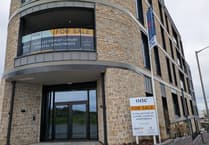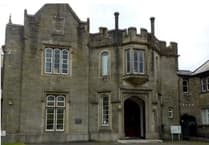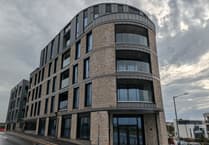The owner of the former Pendower Beach House Hotel – affectionately known as the ‘Pink Hotel’ – has submitted plans for the regeneration of the disused and largely derelict former hotel located on the Roseland Peninsula.
Key features of the plans, which have been updated to reflect feedback from the public consultation process will be outlined at a further community engagement event at Philleigh Village Hall and Community Centre on Monday, March 18 from 4pm to 6pm.
PBHH Ltd’s new plans are 25 per cent smaller in size than those submitted in the original 2020 planning application, and reflect feedback from stakeholders, the general public, the Friends of Pendower Beach organisation, and the parish councils of Philleigh, Gerrans and Veryan.
Described as an “aparthotel”, the regeneration encompasses 23 two-and three-bed family self-catering holiday-let suites; a public café and restaurant with 40 internal and up to 40 external covers; a shop for use by self-catering visitors and beachgoers, and on-site staff accommodation. It is designed to attract year-round visitors – including families with younger children, groups, couples, mature families and retirees – and will create employment for 12 to 15 staff.
The development will require approximately £1-million of necessary stabilisation work to protect road access to Pendower Beach and its slipway, thereby future-proofing Rocky Lane against coastal erosion for years to come.
Johnny Goldsmith, local businessman and founder of PBHH Ltd, said: “Over the past 17 years we have listened carefully to the views of the local community, revising and reducing our plans to take account of feedback, while ensuring that the future of the hotel remains viable in a way that enhances the Roseland Peninsula.
“Bringing income into the wider economy, creating jobs, and both protecting and enhancing the environment, we hope that the new and significantly scaled back plans will be widely welcomed.”
Environment measures include increased use of green roofs, enhanced native planting, retention of significant trees, the increase of canopy cover by 15 per cent, the removal of invasive species and the use of additional Cornish hedging. The result will be a biodiversity net gain score of 17 per cent.
Measures such as bat and bird boxes, bee bricks, and the introduction of a new purpose-built bat roost building – designed to support populations of lesser horseshoe and common pipistrelle bats – will all help to generate an ecological net gain.
PBHH investor Dr David Mlynski, who has a PHD in ecology, added: “Having been brought up in Veryan, spending much of my youth diving for sea urchins or out on the boat catching crab and lobster with my father, I’ve witnessed the hotel fall into a sad state of dereliction.
“The plans that we are putting forward are designed to sensitively breathe life back into the site, regenerating and transforming the former hotel into a valuable local asset that will not only attract affluent visitors, bringing money into the local economy, but also enhance amenities for locals and users of the beach through the restaurant, café and beach shop.
“Combined with activity to safeguard the ecological designations on site, we are confident that the regeneration of the hotel will also play an important part in enhancing the natural environment.”
A decision on the plans by Cornwall Council is anticipated in early summer 2024.





Comments
This article has no comments yet. Be the first to leave a comment.